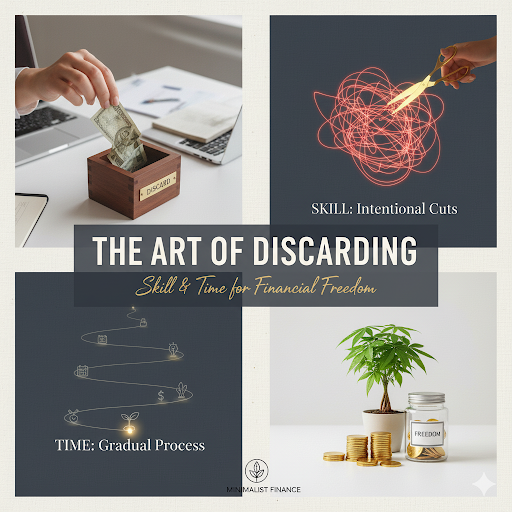The Unseen Skill of Discarding: Mastering the Art of Letting Go for Financial Freedom
- jennifercorkum
- Sep 8, 2025
- 3 min read
Discarding Something Takes Skill and Time: A Minimalist Finance Perspective
In our culture of constant consumption, discarding is often viewed as effortless — a simple act of throwing something away. But in reality, letting go, whether of physical items, financial habits, or even outdated beliefs, takes skill, intention, and time.
In minimalist finance, discarding isn’t just about decluttering your home or your wallet. It’s about making space for clarity, aligning with your values, and reclaiming control over your financial life. The fewer things you cling to unnecessarily, the more room you create for wealth, freedom, and peace of mind.
The Hidden Cost of Holding On
Every item you own and every financial obligation you carry has a cost. It’s not just the price you paid — it’s the mental bandwidth required to maintain, track, and store these things.
Think about it:
That subscription you never use but keep “just in case.”
The investment account you opened years ago but never monitor.
The gadgets, clothes, and furniture shoved into storage.
Each of these creates financial clutter and drains your attention. Minimalist finance teaches us that managing fewer things frees up mental energy and money for what truly matters. But to reach that point, you must first discard — and that’s where the challenge begins.
Why Discarding Feels Hard
Humans naturally resist letting go. Psychologists call this the endowment effect — we overvalue what we own simply because it’s ours. Combine that with fear of regret (“What if I need it later?”), and discarding becomes emotionally charged.
In finance, this manifests when we:
Hold onto underperforming investments because “they’ll bounce back.”
Keep unnecessary insurance plans out of fear of missing coverage.
Cling to outdated budgets that no longer serve our lifestyle.
Letting go requires self-awareness and the courage to face sunk costs. The skill lies in recognizing that what served you yesterday might be holding you back today.
The Skill of Discarding
Discarding is not random purging. It’s a conscious evaluation process:
Assess the ValueAsk yourself: Does this item, habit, or expense add real value to my life? If not, why am I holding onto it?
Separate Sentiment from UtilityA gift, an old subscription, or a luxury item might feel meaningful, but sentiment can’t justify ongoing financial drag.
Adopt the One-In-One-Out RuleFor every new purchase or commitment, release something else. This maintains balance and prevents financial clutter.
Automate Where You CanSimplify by canceling unused services, consolidating accounts, and automating essential payments. The less you manually track, the freer you become.
Skillful discarding is about building intentional systems that prevent future overwhelm.
Time: The Overlooked Ingredient
True decluttering — whether of your finances or possessions — takes time. It’s not a weekend project but an ongoing practice.
Audit Your Subscriptions: Go line by line through your statements. Cancel what no longer aligns with your priorities.
Revisit Investments: Check if your portfolio reflects your current goals and risk tolerance.
Simplify Your Accounts: Close redundant accounts to reduce friction and decision fatigue.
This is a gradual process. Minimalist finance isn’t about rushing to zero; it’s about aligning your financial life with your values, step by step.
Discarding Creates Space for Growth
Every time you let go of something unnecessary, you create space — financially, mentally, and emotionally.
Fewer bills mean more freedom to invest.
Fewer accounts mean clearer financial insights.
Fewer possessions mean less stress and more focus.
In minimalism and finance alike, less is often more. Discarding is the skill that allows you to reclaim your energy and redirect it toward wealth-building, intentional living, and financial independence.
Final Thoughts
Discarding isn’t about deprivation — it’s about curation. It’s choosing what deserves a place in your life and letting go of the rest. This takes skill because you must evaluate with honesty, and it takes time because lasting change is gradual.
When you master the art of discarding, you unlock a minimalist financial mindset where every dollar, possession, and decision serves a purpose. In that clarity lies true freedom.







Comments